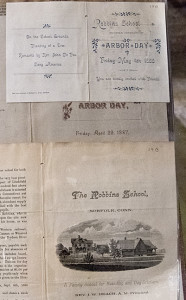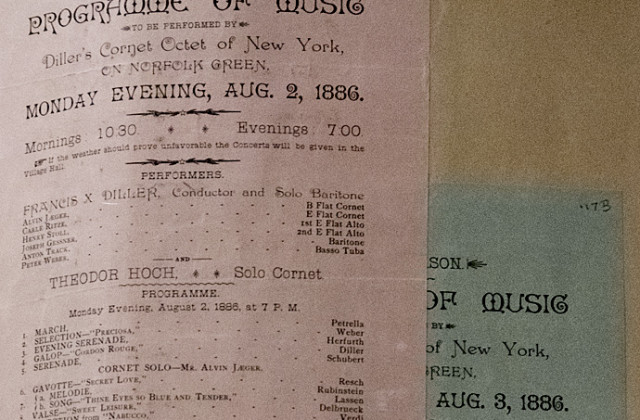Tireless Library Volunteers Work to Document Everyone’s History
Norfolk’s Past and Present in Scrapbooks
By Colleen Gundlach

This image of the Robbins School shows two houses that are still standing near the corner of Route 272 and Mountain Rd.
In the nondescript cabinets to the right of the fireplace in the Great Hall of Norfolk Library is tucked one of Norfolk’s unsung treasures. Here reside volumes that trace the folk history of the town, carefully cut, pasted and archived by dedicated volunteers. From birth to death, if you live or have lived in Norfolk, your history, flattering or not, will be contained here.
Consider the story of Nettie Millard, 21, of South Norfolk and her fiancé, Burt R. Scott, also of South Norfolk, who on July 9, 1901 walked three miles to the village to be married. While waiting for the town clerk’s office to open, the groom visited the “soda water fountain and munched peanuts without even tendering his bride-to-be a treat.” Then, after procuring a marriage license, they “wended their way to the Methodist parsonage.”
Or read the familiar story of the gifting of Eldridge Gymnasium to the town by Mrs. Henry H. Bridgman. Not so well known is the rest of the story, stipulating that the building can never be used for “public theatrical performances by professional players or for moving pictures produced by professionals.”
The Norfolk Scrapbooks, as they are called, have been lovingly maintained by Norfolk resident Barbara Moeckel. Three days a week from 1989 through 2012, Moeckel volunteered at the town’s library, carefully sorting more than a hundred years of newspaper clippings, event programs and photographs of Norfolk and its people.
The items from the 19th and early 20th centuries were clipped from newspapers with names such as The Norfolk Tower, The Norfolk Summit and The Winsted Herald. During her time as keeper of the scrapbooks, Moeckel carefully removed the old clippings and re-pasted them in large volumes archivally preserved in polyester sleeves.
To appreciate the work Moeckel put into organizing these scrapbooks, one only needs to look in the front of volume one, and see the detail and precision of the index. She has carefully gone through each of the oldest two massive volumes and documented, in beautiful handwriting, every story and clipping. She was assisted by Rita Tierney with the indexing of volume three.
While tedious and extremely detailed, “The work was very interesting and extremely satisfying,” says Moeckel. “It was right up my alley.” In addition to preserving the old news, each day she read The Register Citizen, The Waterbury Republican, The Litchfield County Times and The Lakeville Journal, searching for any mention of Norfolk or a Norfolk resident, past or present, to add to the newest volumes.
Health issues forced her to pass the torch to Mary Ford-bey in 2012, but Moeckel continues to volunteer at Geer Village in Canaan where she plays piano for chapel services and also directs the Golden Year Singers, a vocal music group of Geer residents.
Today, Mary Ford-bey can be found at the library on Tuesdays and Wednesdays between 10 a.m. and 3 p.m. most weeks, though sometimes working from her home. She is the one who now reads all of the local papers in search of the latest news and carefully pastes each tidbit into the scrapbooks. The more recent volumes of the Norfolk Scrapbooks are organized by category, such as People in the News, Town Government, or School News.
“I always think as I’m pasting the stories about how many people will read this through the years,” says Ford-bey. “ I’m recording history for the future, whether good or bad.”
Anyone who has lived in Norfolk will most likely find himself at least once in these scrapbooks. These volumes truly are a folk history of the most basic and fundamental kind—the history of a town constructed from the lives of all who lived there.

